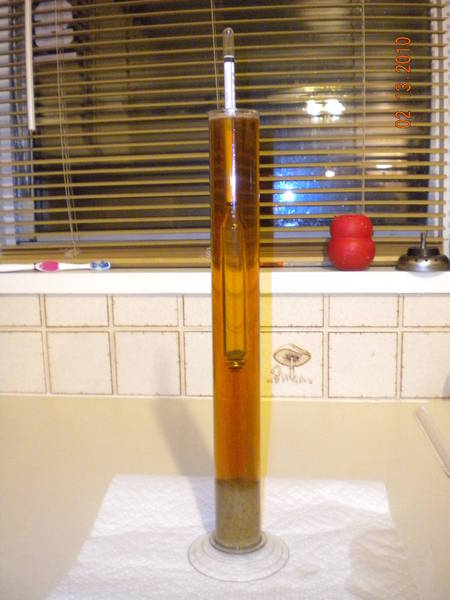Well...last night was the first time I brewed beer and absolutely hated doing it. I started at 7:30 PM and did not finish until 2:30 AM. It was a long night!
I recently purchase a plastic 5 gallon mash tun for my partial mash recipes. This was my first chance to use it. My recipe called for 2.5 lbs of grain (1 lb of crystal malt - 80L, 1 lb of 2-Row, and 0.5 lbs of Cara-Pils/Dextrine). Beer Smith suggested adding 3.13 qts of water at 170 degrees. I added the water, then dumped the grain in and stirred it. The temp was at 140 degrees. This caught me a bit off guard, and I was not prepared, so I had to wait 10 minutes before I had enough hot water to increase the temp to 154 degrees. I periodically checked the mash about every 15 minutes and the temp always seemed to drop to the mid to low 40s, so would just add a bit of water. After the hour was complete, I cycled the wort out into a 2 quart jar and recirculated until the batch become clearer. I took a sample of the wort and checked it with iodine. I have no idea what the results were of that test. I also cooled the same sample to test with a hydrometer. I was shocked to find out that it was only 1.015. That just seemed very low.
I then did two batch sparge rounds. The first sparge was with 2.85 gal of 170 degree water. The second was 3.33 gal of 170 degree water. I slowly transfer all the wort to my new 8 gal boil kettle.
I then added my boil ingredients, 2 lbs of amber dry extract, 3.3 lbs of amber liquid malt extract, and 4 ounces of malto-dextrin extract. I was afraid my SG was low so I added 1 more lb of plain dry malt extract. I guess I did not realize that I should have taken my pre-boil gravity AFTER I added all grains and extract. i tried to take it BEFORE I added my extract... duh!
My next problem was my stove had a hell of a time heating 6.41 gal of wort. It took FOREVER to get to boiling. I then added in 2 onces of Williametter (4.8%) for 60 minute boil. I also added Irish Moss at the 15 minute mark, and 1 once of Hallertauer (4.2%) at the 10 minute mark. It was getting very late...
I could not fit my new 8 gal pot in my sink to ice it an ice bath... This presented another huge problem - cooling the wort. I finally added some ice cubes directly to the wort and sat the pot outside in the snow. This brought the temp down, but it still took forever.
Finally at 2:30 AM I was able to transfer my wort to my plastic fermentor and pitch my Wyeast American Ale (#1056).
I hated last night... Disadvantages: large volumes result in slow boil times, more difficult to cool larger volumes, more energy to heat. I do not have the equipment to do this... Can I lower the water sparge water volumes? What if I do not do a full 6.41 gal boil? Is topping off your wort a good thing? So many questions..
Frustrated..........................







































![Craft A Brew - Safale S-04 Dry Yeast - Fermentis - English Ale Dry Yeast - For English and American Ales and Hard Apple Ciders - Ingredients for Home Brewing - Beer Making Supplies - [1 Pack]](https://m.media-amazon.com/images/I/41fVGNh6JfL._SL500_.jpg)



















